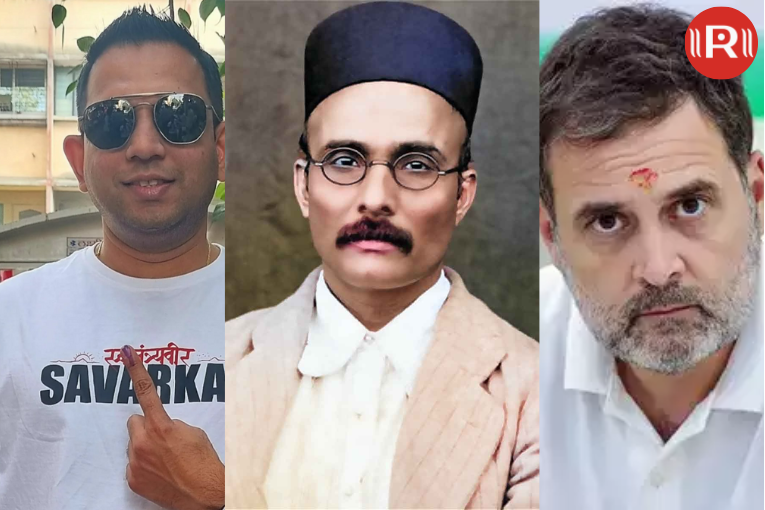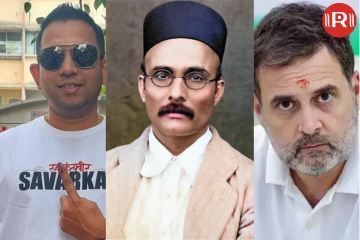Why Satyaki Savarkar, Grandnephew of Vinayak Damodar Savarkar, Took Rahul Gandhi to Court
Explore the defamation case filed by Satyaki Savarkar against Rahul Gandhi over controversial remarks on Vinayak Damodar Savarkar. Dive into the legal battle, key developments, and its political implications.
HINDUTVA NEWS




The political climate in India took a dramatic turn when Satyaki Savarkar, the grandnephew of freedom fighter Vinayak Damodar Savarkar, filed a defamation case against Congress MP Rahul Gandhi. This legal dispute stems from Gandhi’s alleged remarks during a London speech, where he is accused of tarnishing Savarkar’s legacy. Here’s a deep dive into the origins of this case, its legal complexities, and its potential impact on Indian politics.
Satyaki Savarkar
FOLLOW:
The Genesis of the Controversy
In March 2023, Rahul Gandhi addressed the Indian diaspora in London, where he allegedly claimed that Savarkar had described a violent incident involving Muslims in his writings. According to Gandhi, Savarkar and his associates reportedly took pleasure in the act. However, Satyaki Savarkar vehemently denied these assertions, labeling them as false, defamatory, and damaging to the reputation of both his granduncle and the Savarkar name.
In April 2023, Satyaki filed a formal complaint in a Pune magistrate court, accusing Gandhi of defamation under Section 500 of the Indian Penal Code. Alongside the complaint, he submitted news articles and a YouTube video of Gandhi’s London speech as evidence to substantiate his claims.
Rahul Gandhi’s Courtroom Absences
The legal proceedings have been marked by Gandhi’s repeated absence from court hearings, often citing prior commitments such as election campaigns and parliamentary sessions. Key developments include:
October 2024: Rahul Gandhi was summoned by court to appear on October 23, but the summon reportedly did not reach him. A fresh summon was issued for November 18.
November 18, 2024: Gandhi’s lawyer, Milind Pawar, requested an exemption, citing Gandhi’s involvement in election campaigns.
December 2, 2024: Despite a court directive, Gandhi failed to appear, attributing his absence to the winter session of Parliament. His lawyer argued that, as the Leader of the Opposition, Gandhi’s presence in Parliament was crucial.
Legal Wrangling
During the December hearing, Advocate Sangram Kolhatkar, representing Satyaki Savarkar, pressed for a non-bailable warrant against Gandhi under Section 174 of the IPC for failing to comply with court orders. While the court did not issue the warrant, it granted Gandhi another exemption and directed him to appear on January 10, 2025. The court also cautioned Gandhi against making further remarks about Savarkar, emphasizing that the matter was sub judice.
Fact or Fabrication?
Satyaki Savarkar’s accusations against Rahul Gandhi revolve around the claim that his statements were entirely fabricated. He argued that:
No such incident was ever documented in Savarkar’s writings.
Gandhi’s allegations were intentionally false and malicious, aimed at defaming Savarkar and undermining his historical significance.
To support his claims, Satyaki submitted historical records, media reports, and a police inquiry report from Vishrambag Police Station, which concluded that Gandhi’s remarks were defamatory.
Broader Implications
The case has sparked heated debates on multiple fronts:
Freedom of Speech: Critics argue that Gandhi’s statements fall within the realm of free expression and critique of historical figures.
Reverence for Freedom Fighters: Supporters of Satyaki contend that unfounded allegations tarnish the legacy of national heroes and demand legal redress.
Political Polarization: The case underscores the ideological divide between Congress and the proponents of Hindutva, a philosophy closely tied to Savarkar’s legacy.
What Lies Ahead
The next court hearing, set for January 10, 2025, is expected to be a pivotal moment. Whether Rahul Gandhi appears or seeks another exemption will likely influence the case's trajectory and its impact on his political standing.
Conclusion
The Savarkar defamation case highlights the intersection of historical narratives, political speech, and legal accountability in modern India. As the proceedings unfold, the case will shape public discourse on the respect accorded to India’s freedom fighters and the limits of political rhetoric. At its core, this legal battle serves as a reminder of the enduring legacy of historical figures in contemporary politics
